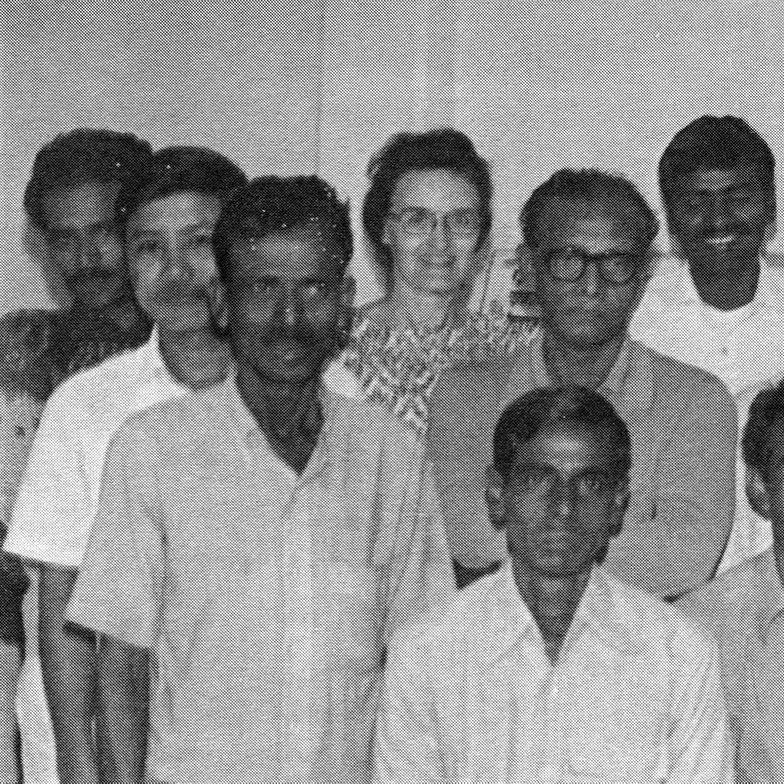Editor’s Note: This article was originally published in 1948 by Harold Commons, ABWE president, and is being republished as part of the Voices of the Past series. It is an excerpt from the article “Basic Principles of the ABWE,” which appeared in Message Volume 14 No. 8, April 1948, pg. 7.
Original style conventions have been retained, as well as some outdated terminology (“native” versus “national”) out of respect to the original work.
The primary aim of the Association of Baptists for World Evangelism, as its name indicates, is evangelism.
Its motto is “the apostolic message and the apostolic method.” With the Book of Acts as our pattern it is very clear that not only did the early Christians go everywhere preaching the gospel, but they took care of the fruits of evangelism by organizing the believers into local churches.
The apostolic method was to take special care of the converts. The fruits of evangelism always need to be conserved. Any evangelistic effort which does not take special pains to conserve its results is not apostolic in its method. The Pauline method is the method of the Holy Spirit. True evangelism, carried out in the New Testament fashion, should always result in the formation and strengthening of local churches. If we fail in this our work does not endure even though souls are saved. Unshepherded converts become cold, worldly, backslidden Christians who are a hindrance to their fellows, a stumbling block to sinners and a spectacle to the world. There is too much modern day evangelism which is a playing to the galleries, the putting on of a big show, and an amassing of statistics for the plaudits of men, when a few weeks or months later it is difficult to put one’s finger on tangible results.
Let us make no mistake about the apostolic message. It is the whole counsel of God. It is to “preach the Word.” It is that “except a man be born again he cannot see the kingdom of God.” It is that “by grace are ye saved, through faith, and that not of yourselves, it is a gift of God; not of works lest any man should boast.” It is the theme of Paul’s first sermon, “and straightway he preached Christ in the synagogues that He is the Son of God.” It is the preaching of “Jesus and the resurrection.” It is that “Christ died for our sins according to the Scriptures; and that He was buried, and that He rose again the third day according to the Scriptures.” It is that “we are buried with Him by baptism into death, that like as Christ was raised up from the dead by the glory of the Father, even so we also should walk in newness of life.” It is that “we must all appear before the judgment seat of Christ.” It is that “this same Jesus—shall so come, in like manner as ye have seen Him go into heaven.” And “he that hath this hope in him purifieth himself, even as He is pure.” It is, “be ye therefore ready, for in an hour that ye think not, the Son of Man cometh.”
It is this apostolic message, coupled with the apostolic method, that produced tremendous results in New Testament times. The shameful periods in church history were brought about by the deletion of the Word of God, the dilution of the message and the discounting of the method. The periods of revival and blessing are those characterized by a return to the Word of God and the preaching of the apostolic message in the apostolic method. By God’s grace we of the Association of Baptists for World Evangelism aim to be true to our motto. In all of our mission fields we work through evangelism in various ways toward the establishment of indigenous churches, the training of a native leadership, the maintenance of sound doctrine and purity of life, and the furtherance of a missionary spirit, to the end that the world may be evangelized and the coming of the Lord hastened.

In a disconnected age where everything is “right now,” it’s easy to forget that every follower of Christ stands on the shoulders of giants. Jesus has been building his church for 2,000 years, and each of us—from the apostles to today—has benefitted from ages of faithful Christian leaders, preachers, teachers, and evangelists who came before.
ABWE is no different. Since 1927, faithful ABWE workers have stood for the truth, suffered loss, and risked all to bring the gospel to the ends of the earth. Our duty to Christ is to listen to them.
Voices of the Past is a new digital feature highlighting these faithful witnesses that lined the way throughout the mission’s history. May their words guide our way today.




